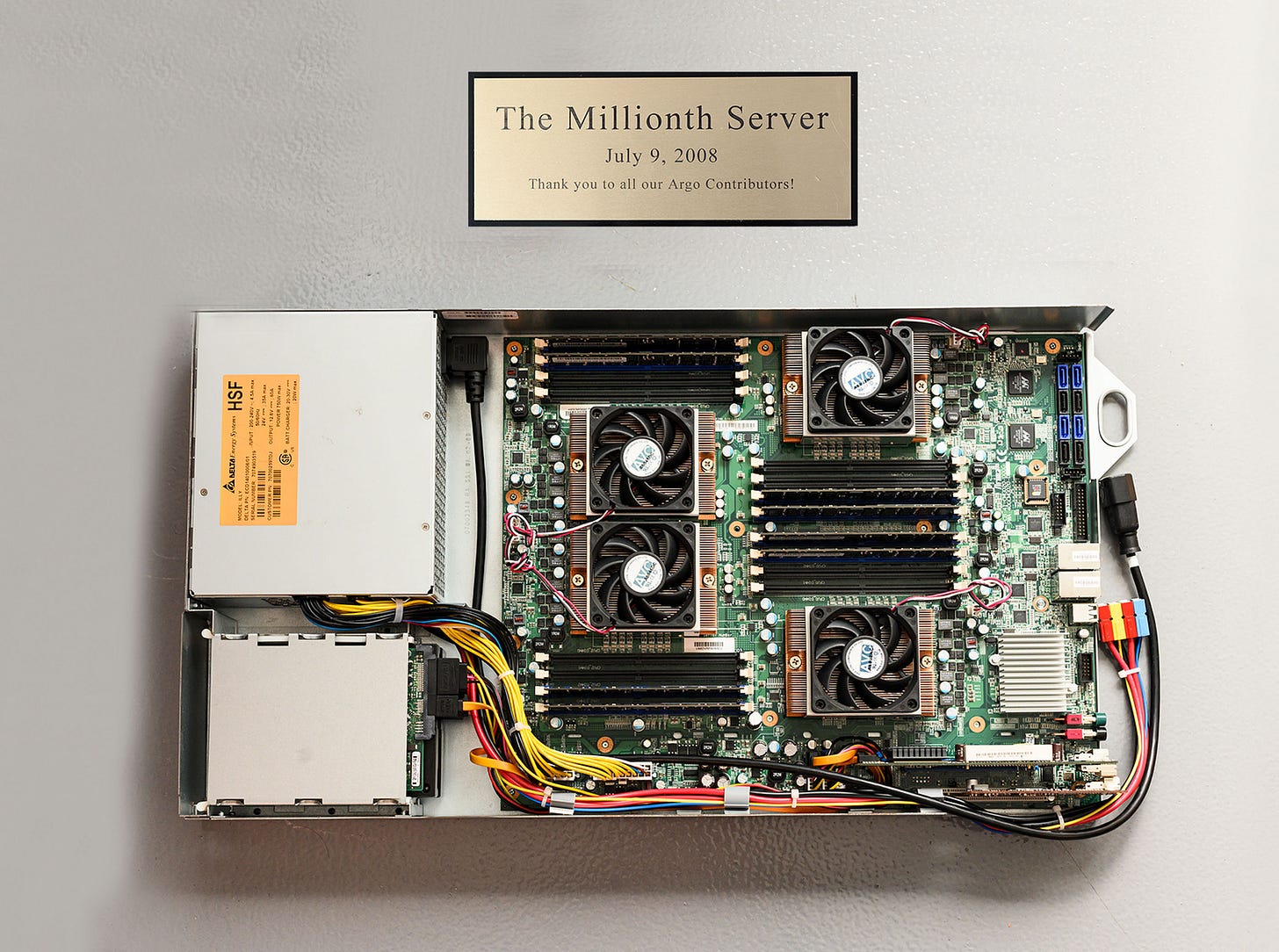
(Photo via @AMD)
Welcome to Mostly Cloudy! It was a big week for server competition, security, and eye-popping Series A funding rounds.
This Week in Cloud: Another Chance For AMD?
It’s been a very long time since AMD enjoyed this much attention from tech buyers.
This week Google Cloud announced that it would support AMD’s second-generation EPYC chips, giving customers of all of the Big Three cloud providers a choice between cloud instances using Intel’s Xeon chips and AMD’s EPYC chips. Microsoft was quick to support AMD’s EPYC server processors when they launched in 2017, and Amazon Web Services jumped on board last year.
The processor is the most fundamental piece of any tech infrastructure — built either on the cloud or in your own data centers — and this is a market that Intel has dominated with at least 95 percent market share for years. The last time server buyers gave AMD’s chips a serious look, George W. Bush was still president.

(Google Photo)
Google (perhaps inadvertently) acknowledged that gap by pointing out in a blog post this week that it has a long history with AMD, having used AMD server processors to build its “one-millionth server” - in 2008. But it’s not just Google Cloud customers that will have access to the new chips: Google said it would also use them in some fashion to run its cash cow search and web products.
In an industry that rarely looks back, AMD has a proud, colorful, and frustrating history as a tech company.
It was founded 50 years ago, just ahead of a summer that produced the moon landing, Woodstock, and the World Champion New York Mets. Run for decades by “Real Men Have Fabs” Jerry Sanders, AMD has had periods of tremendous success followed by years of disastrous results, beset by execution problems and fierce competition (not to mention more than a few shenanigans) from Intel.
This latest upturn comes after manufacturing missteps at Intel delayed some of its most advanced technology, and early reviews indicate that AMD has an advantage for workloads that can take advantage of lots of processing cores. Intel still does better for some applications that require raw clock speed, but that isn’t necessarily the most important factor for lots of modern applications running on cloud services.
It takes a long time for server processor market share to shift, given that replacement cycles at big cloud buyers stretch out a few years. But it’s good to see choice in the cloud; choice gives software developers additional options to improve the performance of their applications, and that’s good for all of us.
But if AMD squanders this opportunity to really change the server market — again — expect to hear a lot more about Arm servers over the next few years.
And Now, A Word

It was another rough week for media companies, a group that over the last 20 years has made AMD look like Amazon. On the enterprise tech side, Linux Journal announced it would be abruptly shutting down this week after decades of faithfully telling the story of the open-source movement that upended enterprise computing.
Right now, Mostly Cloudy is free. But starting on September 3rd, a subscription will cost $10 a month. I’m hopeful that a to-be-determined level of subscribers will allow me to devote more time to this humble newsletter, increasing both the amount of original content and the frequency at which it is published.
I’ll still publish a few things that will be available for free, but I’d like to spend most of my time helping paid subscribers keep on top of this fast-changing industry. Please stick around, and you’ll get a month’s worth of premium cloud content for the price of running a a1.large dedicated instance on AWS for a week.
Security and the Cloud
I noted Microsoft’s expanded Azure bug bounty program in Tuesday’s newsletter, but wanted to call out a few other cloud-related security topics that came up this week during Black Hat and Defcon, the security industry’s Super Bowl.

(DefCon Image)
Researchers Discovered a Big Security Flaw In This Important Microsoft Product (Fortune)
It’s Hyper-V; death to curiosity-gap headlines. Check Point Software researchers disclosed that they had identified a bug — which Microsoft has already fixed — that could let attackers using phishing attacks take control of computers connected to virtual machines in the cloud.
Phishing Attacks Enlist Amazon AWS, Microsoft Azure in Ploys (Threatpost)
After security software picked up on a trend among phishing attacks that used storage services like Dropbox and Google Drive, some attackers are now using cloud storage services to disguise their activities. This is, of course, against the terms of service of both cloud providers, but like a lot of security work, it’s a game of whack-a-mole.
Hundreds of exposed Amazon cloud backups found leaking sensitive data (Techcrunch)
We’ve all talked a lot about exposed S3 storage buckets on AWS, but an enterprising security researcher discovered that cloud users are making the same mistakes with a different AWS storage product: Elastic Block Storage. Elastic Block Storage allows users to store a much larger amount of data across their cloud computing instances, and Ben Morris of Bishop Fox found that cloud administrators are making the same sort of configuration mistakes that Capital One made on a service where the consequences are potentially much greater.
Around the Cloud
Far-Right Haven Gab.com Had Its Fundraising Site Shut Down By Amazon (Buzzfeed)
Cloud companies are getting serious about removing assholes from their midst. Gab was a favorite site of the mass shooter who killed 11 worshipers at a synagogue in Pittsburgh last year, and its attempt to raise money via a site hosted on AWS was shut down this week after it was discovered by fellow Substacker Judd Legum.
HashiConf EU 2019: The Service Mesh push and Progressive Delivery (Redmonk)

HashiCorp co-founder Armon Dadgar greets attendees at HashiConf EU. (HashiCorp Photo)
As companies embrace microservices — applications built around lots of small pieces that can be independently updated and configured — the need for something to route traffic between those microservices becomes more important. Service-mesh technology is emerging as an important part of the microservices tech stack, and HashiCorp has raised a ton of money behind products that tackle this space.
Salesforce acquires field-service company ClickSoftware for $1.35 billion (CNBC)
Salesforce is on a bit of a spending spree lately, as co-founder Marc Benioff starts to execute the “buy everything that is growing faster than us” enterprise software strategy pursued by Oracle CEO Larry Ellison in the 2000s. The price for ClickSoftware is a lot more palatable than the $15.7 billion Salesforce paid for Tableau, and it will add field-service software expertise to Salesforce’s Service Cloud product.
GitHub Actions moves GitHub into DevOps (ZDnet)
GitHub has released some very interesting products in its first year under Microsoft, adding to that ledger this week with GitHub Actions. The new product allows GitHub users to embrace the continuous integration/continuous delivery movement by taking code stored in GitHub code repositories and actually deploying it to the public.
Seeding the Cloud
No-Code Website Builder Webflow Went From Near Bankruptcy To A $72 Million Series A Funding Round (Forbes)
Seventy. Two. Million. Dollar. Series. A. Round.
Companies working on low-code or no-code software development tools are definitely on to something, but that is a lot of cash for a company that has now raised a total of $74.9 million dollars. At least Webflow has actual revenue — on a pace to do $20 million on a yearly basis, according to Forbes — and real customers using its technology to make web development way easier.


